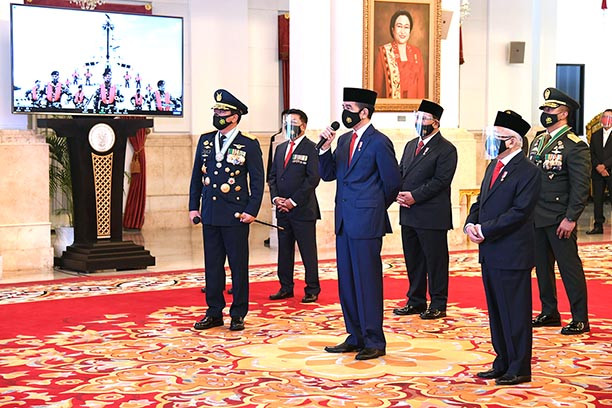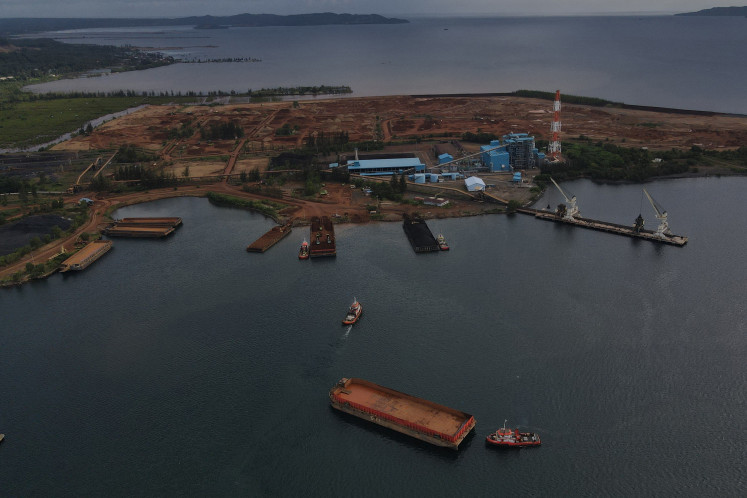Popular Reads
Top Results
Can't find what you're looking for?
View all search resultsPopular Reads
Top Results
Can't find what you're looking for?
View all search resultsSukarno, Soeharto no more
In this style of subtle Indonesian politics, repeated denial can also mean confirmation.
Change text size
Gift Premium Articles
to Anyone
 Top brass: President Joko “Jokowi” Widodo (center) talks to Indonesian Military (TNI) personnel in a virtual event to commemorate the 75th anniversary of the TNI at the State Palace in Jakarta on Monday. The President was accompanied by Vice President Ma’ruf Amin, Defense Minister Prabowo Subianto, TNI commander Air Chief Marshal Hadi Tjahjanto, Presidential Chief of Staff Moeldoko and Army chief of staff Gen. Andika Perkasa, among others. (Courtesy of Presidential Secretariat/Lukas)
Top brass: President Joko “Jokowi” Widodo (center) talks to Indonesian Military (TNI) personnel in a virtual event to commemorate the 75th anniversary of the TNI at the State Palace in Jakarta on Monday. The President was accompanied by Vice President Ma’ruf Amin, Defense Minister Prabowo Subianto, TNI commander Air Chief Marshal Hadi Tjahjanto, Presidential Chief of Staff Moeldoko and Army chief of staff Gen. Andika Perkasa, among others. (Courtesy of Presidential Secretariat/Lukas)
P
resident Joko “Jokowi” Widodo has repeatedly — sometimes in a firm tone — ruled out any possibility of him serving a third term in office when his mandate expires in October 2024. He described efforts by those supporting an extension of his tenure as a slap in the face and a form of humiliation.
But Jokowi’s public denial of any intention to hold on to power beyond 2024 does not stop the discourse about the third presidential term. There are hardline supporters of Jokowi and obviously certain political elites who uphold the narrative that Indonesia has no choice but to let Jokowi rule longer.
The amended 1945 Constitution clearly limits the presidential term to two five-year periods so as not to repeat the abuse of power and the decline of constitutional democracy seen in the past. For 53 years after Indonesia’s independence in 1945, the nation allowed two strongmen, Sukarno and Soeharto, to lead and guide the country in accordance with their wishes.
Sukarno was in power for 21 years and Soeharto for 32 years, during which they acted as no less than dictators who gave no room to the opposition in the name of national unity. The Constitution during their times knew no limitation of the presidential term as it only stipulated that the president and vice president could be reelected.
The most serious breach of democracy under Sukarno came in 1963 when he appointed himself, through the Provisional People’s Consultative Assembly (MPRS), Indonesia's president for life. His successor Soeharto followed the same tactic by orchestrating a “unanimous endorsement” by the People's Consultative Assembly (MPR) to reelect him as president again and again.
Soeharto stepped down in May 1998, leaving behind a corrupt bureaucracy and an ailing economy hit hard by the Asian financial crisis — but paving the way for sweeping reforms that included the return of democracy. In the spirit of reform, the 1945 Constitution was amended four times to pave the way for direct presidential election and to ensure that the president can only serve two five-year terms.
Following the fall of Soeharto, the nation vowed not to repeat the tragedy of authoritarianism. Indonesia's hard-won democracy has given its people back the right to choose their national leader and to a large extent, provided fertile ground for local leaders to move up the ladder in national politics. In this regard, Jokowi owes his rise to the highest office to the Reformasi (Reform).
We do believe in Jokowi’s sincerity to abide by the Constitution and to refrain from killing the reformasi spirit by engaging in a political maneuver to amend the Constitution that will allow him to run for the presidency in 2024. But with the election still three years away, many things can happen, including Jokowi changing his mind at the very last moment.
In this style of subtle Indonesian politics, repeated denial can also mean confirmation.
In the name of freedom of expression, surely we cannot ban any group or individual's aspirations for an extension of the presidential term. But if it materializes, its adverse impact on Indonesian democracy will be overarching — similar to what happened in the past.
As the old saying goes, “Not even a donkey falls in the same hole twice”. When we allow Jokowi to follow in the footsteps of Sukarno and Soeharto by hijacking procedural democracy, does it mean we are dumber than a donkey?









